Three narratives dissuading pro-Trump communities from organizing on behalf of the former president
By: Jared Holt
29 March 2023
___________________________________________________________________________
Donald Trump’s most loyal supporters’ own conspiratorial tendencies are rebounding on the former president, who has recently struggled to mobilize his followers en masse as he did after the 2020 elections. Audiences of hundreds or thousands that could once be mobilized by a tweet or baseless accusation have become wary, as narratives spread promoting paranoia of federal surveillance or sabotage, uncertainty toward Trump’s own loyalty, and cynicism about their fates if faced with the US legal system – all of which can be sourced, at least partially, to the sweeping investigations and arrests that followed the January 6 attack.
These fears have influenced not only these pro-Trump communities’ desires to engage in political protests, but also how they talk about those protests online. Seeing Capitol riot cases and other indications that their online activities face increased scrutiny in today’s political environment, many communities most known for their gushing support of Trump have shied away from, or even lobbed accusations against, those who have attempted to rile up other members of their communities toward larger pro-Trump political actions. Today, some of the nation’s most contentious protests are playing out on small scales, targeting minority communities and local institutions rather than the larger machinations of a federal government they ultimately fear.
ISD has observed these same trends holding in the wake of news that Trump could soon face felony criminal charges in New York if the Manhattan district attorney’s office can convince a grand jury that Trump broke the law related to the ‘hush money’ payment of $130,000 meant to cover-up an alleged affair. Though some efforts to organize protests in different states, including, but not limited to New York, Arizona, New Jersey and California, have been observed, ISD analysts have not witnessed indicators that would suggest a mass mobilization of protests or violence is likely at this time. Rather, ISD analysts have noted the proliferation of familiar, and often discouraging, attitudes about such actions among pro-Trump online communities.
The remainder of this Dispatch offers analysis of three narratives observed since the Capitol riot that have shown sustained frequency and popularity among pro-Trump communities following major news events that could have inspired Trump’s fiercest supporters to respond with unlawful or disruptive activity, including attacks, protests, and political organizing. These narratives are not meant to represent the totality of opinions shared about protesting or other political actions among online pro-Trump communities. Instead, this analysis examines how these narratives may serve to internally suppress desires to protest within pro-Trump communities that otherwise may feel tempted to mobilize on the former president’s behalf.
Allegations that Federal law enforcement unfairly targets Trump supporters
Conspiracy theories promoting fears of immediate legal consequences against those who attend pro-Trump protests likely act as a deterrent to would-be attendees. Influential pro-Trump voices online and in broadcast media have asserted that federal law enforcement agencies like the FBI disproportionately target Trump supporters for their actions and that the arrests of Capitol riot participants are clear examples of that alleged bias. Drawing on these beliefs, pro-Trump communities and influencers have speculated and claimed that federal law enforcement agents are likely to entrap Trump supporters at protests, potentially even conducting “false flag” operations to justify further persecution of Trump and his followers.1 These theories have received buy-in from across the spectrum of the conservative movement, including from elected officials like Rep. Marjorie Taylor Green (R), conspiracy theory media outlets like Infowars, and extremist groups like the Proud Boys—all of which are notable for their encouragement of, or participation in, the 2020 Stop the Steal movement that preceded the Capitol riot.
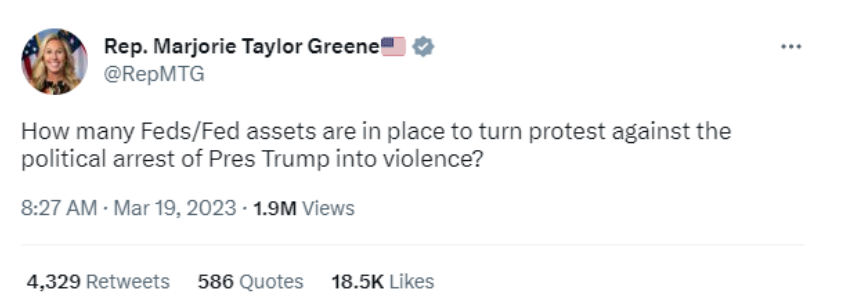
Figure 1: Rep. Marjorie Taylor Green posts a rhetorical question on Twitter, wondering whether “Fed assets” are in place to produce violence at pro-Trump protests.
High-profile and conspiratorial conservative figures have alleged for years—long before the Capitol riot—that the US government targets conservatives unfairly, applying unjustified scrutiny and investigative resources to their activities for partisan political reasons. However, criminal probes against Trump and his associates, investigations into foreign influence during the 2016 presidential election, and the arrest of Trump supporters for politically-motivated crimes brought this longstanding rhetoric to the front and center of mainstream political discourse. Even today, Trump speaks often and at length about supposed “deep state” conspiracies that allegedly seek to undo his elected power and punish those who voted him into office. Adherents to these theories often believe that the movements and candidates they support represent a threat to people, groups, and systems engaged in secretive social, economic, and environmental engineering that threatens their freedom, and that law enforcement is keen to protect those interests.
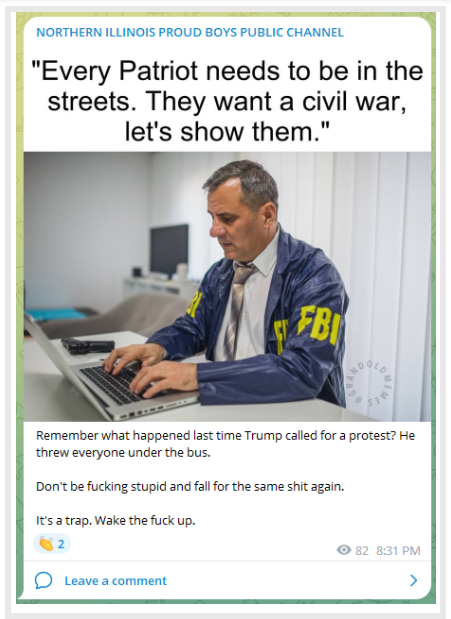
Figure 2: A meme shared in a public Proud Boys channel on Telegram depicts an FBI agent encouraging violence online. The group faulted Trump for not supporting Capitol riot defendants and warned its audience not to “fall for the same shit again.”
Trump fans who may otherwise be motivated to engage in both legal and illegal actions in anticipation that Trump may face criminal charges may be dissuaded by their own conspiratorial worldviews and fears of legal consequences, like those experienced by Capitol rioters. These narratives also provide a potential deterrent for some people who may otherwise act violently in public with the belief they are advancing a political cause by doing so (This dynamic, however, will certainly not deter every lone actor who may wish to enact violence for pro-Trump political motives). Pro-Trump communities, for example, largely do not remember the man who attacked an FBI office in Ohio as a hero. Instead, he was widely accused by pro-Trump communities of being part of a false flag attack against Trump supporters. Rolling Stone reported in August that Trump has privately entertained such theories.
Faulting Trump for perceived shortcomings in supporting Capitol riot defendants
Narratives asserting that Trump has not adequately supported Capitol riot defendants has encouraged resentment among some of his supporters and may dissuade further placing themselves in perceived risk on his behalf. After the riot, several people criminally charged for actions related to the attack held out hope that Trump would use his remaining time in office to grant them full pardons. Trump did not grant the pardons, but instead has dangled the possibility of pardoning Capitol rioters if he is elected president in 2024. Some media figures who were overwhelmingly supportive of Trump in 2020 have since faulted him for a perceived lack of material support for those charged— the exception being the occasional public lip service and the charity song he contributed to alongside imprisoned Capitol rioters. This perception of disappointment is especially pervasive among those most directly implicated in the riot, including extremist groups like the Proud Boys and far-right activists like Ali Alexander.
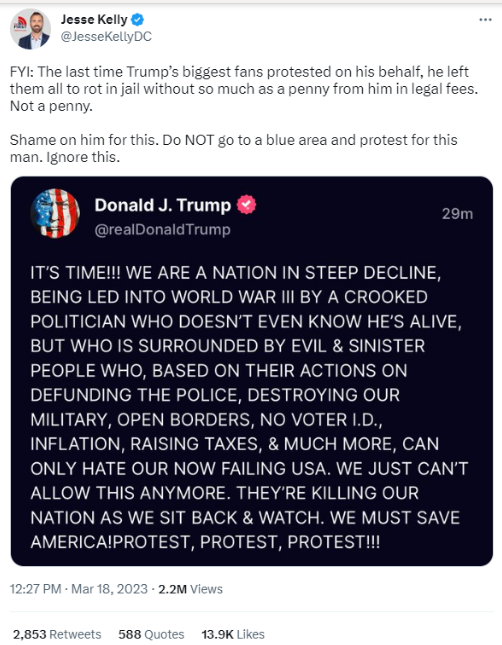
Figure 3: Conservative commentator Jesse Kelly tweets that Trump left his followers “to rot in jail without so much as a penny from him in legal fees” after the Capitol riot and discouraged protests on Trump’s behalf.
A similar lack of enthusiasm was evident during the 2022 midterms. On Election Day, Trump told his supporters on Truth Social to “protest, protest, protest” in Detroit, Michigan, in response to a temporary software issue reported at one of the city’s polling locations. No protests of note ever materialized. At the time, Trump supporters posting to forum boards online argued over the concept of a protest, similar to how they are discussing the notion of protests today.
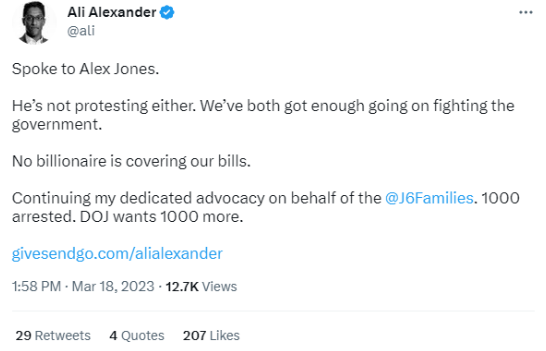
Figure 4: Stop the Steal organizer Ali Alexander tweets that neither he nor conspiracy theorist radio host Alex Jones will join pro-Trump protests over the potential indictments because “no billionaire is covering our bills” and the duo has “enough going on fighting the government.”
Trump supporters who may have previously been willing to engage in disruptive or violent behavior may choose to abstain from doing so if they believe that Trump will opt out of supporting them if faced with consequences for their actions. Testimonies in several Capitol rioters’ criminal cases, as well as the findings of the House select committee that investigated the attack, suggest that at least some Capitol riot participants believed they were fulfilling the wishes of their president through their actions on January 6.
Asserting law enforcement and legal systems treat Trump supporters unfairly
Pro-Trump communities have expressed online that law enforcement officers and judges are adversarial toward Trump supporters. These beliefs may increase perceived risks associated with protests on the former president’s behalf. Though less common than the two previously mentioned narratives, some pro-Trump community members have expressed skepticism or disdain for the US legal system, believing it is rigged against conservatives. These attitudes often dovetail with other conspiracy theories about judiciary systems, like those that suggest that Jewish billionaire George Soros is the driving force behind the elections of Democrat district attorneys and law enforcement, or those that suggest the FBI possesses an unspoken political agenda that is purportedly visible when comparing the investigations of Capitol rioters to participants in the 2020 racial justice protests that led to riots.
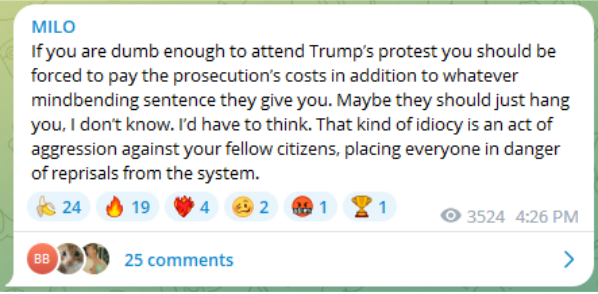
Figure 5: Prolific far-right influencer Milo Yiannopoulos writes on Telegram that anyone “dumb enough” to answer Trump’s call for protests deserves the “mindbending sentence” they receive, since it would put others “in danger of reprisals from the system.”
In addition to fears that participation in Trump-motivated protests will result in arrests, narratives that promote distrust in the nation’s legal system may offer further reasons for would-be participants to avoid engaging in disruptive or unlawful behavior on Trump’s behalf. A belief that legal consequences, even if perceived to be unfair, are all but inevitable and unescapable will possibly dissuade those who might have otherwise engaged.
Conclusion
In 2023, pro-Trump communities have had to come to terms with US-society’s legal system in the face of criminal prosecutions for actions from January 6 and related demonstrations. With a perceived lack of material support from Trump in return for their conspiracy-driven support— support that now is costing many of them time in jail— Trump ‘fans’ have walked back their support on the basis of three overarching narratives: fear of legal consequences for attending pro-Trump protests, disappointment in Trump’s support for Capitol riot defendants both while in office and afterward, and an increased sense of risk of supporting Trump due to alleged targeting from law enforcement.
These narratives have dissuaded even the highest profile influencers who were once the loudest of Trump’s supporters such as Stop the Steal organizer Ali Alexander and the Proud Boys. However, these individuals’ reticence about continuing to support Trump has not eroded their propensity towards conspiracy or their enthusiasm for political activism. Many have refocused their efforts on other hard line candidates, or else rallied behind organizations that attempt to play within the normal boundaries of politics. As US society continues to face difficult times of political and social division, it will continue to be worth paying attention to how those who once supported the former President to the hilt are changing their allegiances.



